Identity: The Future of a Paradox
When Publius Virgilius Maro, more familiarly Virgil, accepted the commission from Augustus, formerly Gaius Octavius, to create an identity for the Roman people by matching the epic precocity of Homer’s Iliad and Odyssey, the imperial presumption can only have been that such an identity did not yet exist or, at least, did not adequately exist, but required to be conjured into a useful state of being. Virgil’s famous ambiguity about his manuscript of the Aeneid – his having composed a note during his fatal illness asking his friends to burn its pages – is usually ascribed by scholarship to his worry about metrical imperfections in some verses of the poem’s second half. As only a few such technical flaws make themselves evident, however, some other explanation must prevail. The German novelist Hermann Broch, in his Death of Virgil (1945), suggests a crisis of conscience, reflecting the poet’s qualm that in synthesizing a myth of Latin and Roman origins so as to settle legitimacy on the heir of Julius Caesar, and thus also on the newly constituted monarchy into which the Republic had disappeared, he had falsified history and served propaganda, whereas his highest calling was to honor the muse by cultivating her art. The crisis of identity appears as a theme in the Aeneid, the first six books of which narrate the exile and homelessness of the refugees from Troy, whose buildings the besieging Greeks have toppled and burned, whose men they have slaughtered, and whose women and children they have impressed into slavery. Troy is no more; no more is the Trojan people. There is only a desperate remnant in flight.

Hermann Broch
What exactly is the identity of that remnant? Virgil just as often refers to his hero and those who follow him as Phrygians or Dardanians or Teucrians as he refers to them as Trojans, and not only to have synonyms to accommodate his hexametrical requirement. According to the poet, for example, the eponymous Dardanus, father to Aeneas’ wife Creusa, stands as primordial ancestor to none other than Romulus and Remus, the twin co-founders of Rome, the first incidentally the murderer of the second, but this genealogy belongs to the insistent conjuration in Virgil’s narrative.
Such identity as the mixed band of Trojan allies who escape with Aeneas possesses stems largely from the fascination inherent in the talismans that Anchises, the father of Aeneas, bids his son take with him to sea when the fleet of salvation surreptitiously sails. Anchises retrieves the Penates (from the Latin penus, the innermost room and shrine of the house) when a divine omen, changing his heart, prompts him to flee death with his son rather than die in defending his bower. This is the moment in the story when Aeneas lifts Anchises on his shoulders, the son literally bearing the burden of the father, to carry him to safety. Aeneas himself explains the necessity of the gesture: His hands bloodied by fighting, they would profane the idols by their pollution; but Anchises, whose blade has tasted no flesh, may gather them in his unsullied grasp, avoiding any sacrilege. Later on, having been expelled a second time from what seemed auspicious and welcoming shores and sailing again in search of an unknown port, Aeneas visits the Penates in the makeshift chapel on board. Virgil gives it to Aeneas to account to Queen Dido how “the holy images of the gods, the Phrygian Penates whom I had rescued from the thick of the flames of the burning city of Troy, seemed to me to be standing bathed in clear light before my eyes, where the full moon streamed in through the unshuttered windows.”1 Suddenly, the images speak to him, channeling the voice of Apollo, who announces at last the destination where a New Troy will arise – the place called Hesperia, which will latterly reveal itself as the Plain of Latium.
Fustel de Coulanges, writing in The Ancient City (1864), describes the story of the Aeneid as consisting in no more but also no less than “the arrival of Aeneas, or rather the removal of the gods of Troy into Italy.”2 Coulanges remarks the misunderstanding with which modern readers behold Virgil’s hero. He seems to them to hesitate, where the Homeric style of heroism calls forth action: “They are astonished to see this warrior consulting his Penates with a care so scrupulous, invoking some deity at every new turn of affairs, raising his arms to heaven when he ought to be fighting, allowing himself to be tossed all over the seas by the oracles, and shedding tears at the sight of danger.”3 It is almost as though Aeneas disappears into a totally curatorial role, such that the tutelary gods rather than the hero fill the role in Virgil’s narrative of protagonist. Coulanges insists, however, that the gods “take the place of a hero… the same gods that, one day, are to be those of Rome.”4 This must be so because, the Greeks having abolished Troy, the essence of Trojan civitas now lies confined in the material representations, the statuary likenesses, but in a suspended condition until the wanderers can ensconce them in a new home.
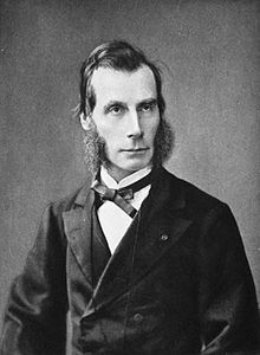
Fustel de Coulanges
When Aeneas first sets his eyes on Carthage, about the construction of whose civic buildings the architects visibly busy themselves, he feels a sharp personal rebuke in it. Aeneas exclaims to Achates: “How fortunate they are… Their walls are already rising!”5 In particular, Dido, herself a refugee, has decreed a temple to Juno, which stands complete. Virgil writes that Juno herself led the exiled Tyrians to the safe harbor of their new city, such that the temple gives thanks to the goddess. Bronze doors adorn the structure and bas-reliefs adorn the doors. These reliefs illustrate – of all sights that might amaze Aeneas – the Trojan defense of the stricken city. Once more Aeneas feels the pangs of forlornness, thinking to himself that, “the Trojan War was already famous throughout the world”; and he asks of Achates, “Is there anywhere now on the face of the earth that is not full of the knowledge of our misfortunes?”6 These reactions imply a vexed mixture of emotions: While humiliation over his own failure must overwhelm the hero, and even a touch of resentment (“their walls”), he yet recognizes that, “we are known here,” a fact that should “give… some hope for the future.”7 The ekpyrosis of Troy has suspended the past; now in futurity alone does the viability of the people reside, as a thing that once was and which might be again, but without any guarantee. Aeneas knows also that people who dedicate altars to the gods are pious hence civilized and that they will honor the laws of hospitality and aid those legitimately seeking asylum.
Virgil’s concentration of so many details in this short sequence also signifies. Just as the Penates have become detached from their proper home, the legend of the Trojans and their allies has become detached from its enactors. The Trojan pathos now consists in a figural relief in bronze emblazoning a foreign edifice. This is but another way of saying that the enactors, facing the suspension of their futurity, suffer a simultaneous and concomitant suspension of their identity, to which another people has given representation, in a kind of inadvertent yet, to Aeneas, stinging act of dispossession. Wanting and desiring along with resentment indicate awareness of dispossession because he who possesses something cannot want it or desire it, nor does the actual possessor of something think of himself as the one who possesses. He cannot think of himself that way because he is what he possesses, especially in terms of non-tangible properties like identity; and possession only becomes thematic in its alienation. Coulanges writes that the ancient household’s paterfamilial altar “is the symbol of a sedentary life,” which “its name [Hestia or Vesta] indicates”; moreover, the altar “must be placed upon the ground” and “once established, it cannot be moved.”8 The family, and latterly the people, may remove the hearth, which is associated with the ancestors, “only when hard necessity presses” or “when an enemy is pursuing.”9 Coulanges writes: “As the gods were attached to a city forever, so the people could never again abandon a place where their gods were established.”10
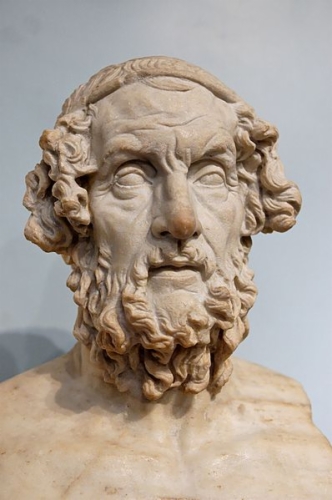
Marble bust of Homer.
The moment when Aeneas glimpses his own story in the temple’s bas-reliefs has an exact counterpart in Homer’s Odyssey, when Odysseus, being received with extravagant hospitality in the court of Alcinous, in the kingdom of Phaeacia, hears the bard singing the cantos of his recent exploits. Virgil’s Carthage episode communicates with Homer’s Scheria episode in other ways. For example, Alcinous hints to Odysseus that his daughter Nausicaä is marriageable with the implication that wedded to her the guest might remain in Scheria and enjoy high station; likewise, Dido offers herself in marriage to Aeneas although unlike Odysseus, Aeneas seems initially to respond to the overture. Both reject the overture, however, Odysseus with a good deal more tact and courtesy than Aeneas but for a similar deep-seated reason. Odysseus already possesses a wife and family, to which he wants to return. Aeneas, although a widower, has subordinated himself to the reinstauration of the Trojan line, supposing it possible. If Odysseus accepted Alcinous’ tacit invitation, it would entail the betrayal of his proper home and family. If Aeneas accepted Dido’s more-than-tacit invitation, it would entail a similar betrayal of the Penates, into whom the obligations to the ancestors and the possibility of a proper new household have contracted. Hearth and family are inseparable; no one may worship at two hearths, nor may foci be fused.
Virgil knew his Homer well, modeling the first half of his Roman epic on the Odyssey and the second half on the Iliad. Virgil fell ill and died while undertaking a leisurely antiquarian tour of Greece – in the wake, more or less, of Augustus, who was also traveling there on tour. Yet the Aeneid, while imitating Homer, differentiates itself from its model-texts in one ironic and rather scandalous way. While in the Iliad and the Odyssey Trojans and Greeks stand at enmity towards one another and the storytelling is more or less Greco-centric, the Trojans never appear under Homer’s authorship as a villainous people. Quite the contrary where it concerns the Aeneid, in which Virgil rarely spares the Greeks, whom the refugees often encounter and just as frequently recall, from a rich vocabulary of censure and execration. A hoary saying about gift-bearers, born in this Virgilian trait, enjoys currency to this day. The ethnic hostility of Virgil’s hexameters seems out of place, askew to the artistic debt of the poem, askew even to the greater civilizational debt of Romanitas to its tutelary Hellenism. What is the point? Homer’s conflict strikes readers as more poignant than Virgil’s precisely because both sides exhibit the same aristocratic virtues. By contrast, Virgil’s younger contemporary and artistic equal Publius Ovidius Naso – or plain old Ovid – knows no such spiteful partiality but, reproducing Homer’s equanimity, indeed makes a philosophical Greek from Crotona in Southern Italy the teacher of intellectual life to the previously untutored Latinate people.
In the concluding book of Ovid’s Metamorphoses, the Italiotes, including the Romans, gratefully receive instruction from Pythagoras. Like Aeneas’ vision-of-the-future set in the legendary past, when in Pluto’s realm under the guidance of Anchises’ ghost he sees the yet-to-be-born souls of his future descendants lining up for reincarnation, including his remote agnate descendant Augustus Caesar, Pythagoras’ prophecy to the gathered farmers, herdsmen, and small-tradesmen of the village-based agricultural society addresses the present from the fictionalized past, as though the actual present were the future, clairvoyantly foreseen. The theme of the historical part of Pythagoras’ oration is, in consonance with the overarching theme of Ovid’s fifteen books, change: “We see times change and civilizations / rise and fall.”11 Troy, for example, once was “great in riches” but now “all she can show / for her glorious wealth is ancestral barrows and ancient ruins.”12 So too Mycenae, Pythagoras continues, and Sparta, and Athens. If Rome herself were a “city of Phrygian grandsons” stemming from Aeneas and soon to be the seat of Imperium, then “the Greeks,” as Ovid arranges for his philosopher to conclude, “won a war for the good of the Trojans.”13
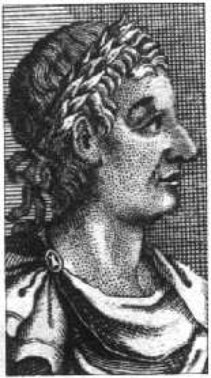
Publius Ovidius Naso
As does the Redemption in the New Testament to the Fall in the Old, so Ovid’s rhetorical transformation makes what Virgil insistently represents as a wicked enormity into a supremely ironic boon, whose main intention – exterminating the Trojan race and obliterating all signs of its existence – the course of remorseless time completely reverses. Supposing that an essential tenet of the archaic hearth-cult is acknowledging always the debt of the living gens to its progenitors, then that same rhetorical transformation discovers what Virgil, in his poem, conceals: The massive pedagogical debt of Roman civilization to Greek civilization. Ovid sees the luck in the relation. Virgil interprets cultural secondarity invidiously. Can a world-empire, or can certain bearers of it, resent its own or their own status as the imitation and later the aggrandizement of an external principal? The Aeneid itself answers the question. Ovid, for his part, is responding by a counter-argument to the anti-Hellenic bias of Virgil’s poem. One is reminded of the “People’s Front of Judaea” sketch in the Monty Python movie The Life of Brian (1979), where the leader of an anti-Roman cabal asks archly, what have the Romans ever done for us? After an awkward pause, a timid response suggests aqueducts, and this is followed with decreasing timidity by a slew of other suggestions: Public sanitation, roads, law, civic order, wine, and education.
Had Ovid written the scene, he might have added: Literacy, right down to the alphabet; literature, philosophy, and science. Yet Ovid, while a sophisticate, had at least as much sympathy for the Roman past as Virgil, as the former’s Fasti, an extended poetic study of the Old Italian sacred calendar, shows. The project of such a poem constitutes a type of ancestor-worship removed but not entirely detached from the archaic hearth-cult, whose piety it replicates in its scholarly and belletristic fastidiousness. Friedrich Schiller, author of the treatise On the Aesthetic Education of Man (1794), would have categorized the Fasti as sentimental and its primordial models, hearth-worship and the rota of feasts, as naïve although those words mean something rather different nowadays than when Schiller first applied them. The word sentimental in particular has seen itself sentimentalized in modern usage. Schiller did, in fact, categorize the Aeneid as sentimental, in distinction from the Iliad and the Odyssey, which he categorized as naïve. By naïve Schiller meant spontaneous and original, inventive and foundational, setting in place an ethos meant to endure, but with no intention except in relation to itself. Homer never wrote the Iliad and the Odyssey so that, a millennium later, Virgil might imitate them in a barbarous tongue.
How might Schiller have categorized the Welshman Geoffrey of Monmouth’s History of the Kings of Britain (mid-Twelfth Century) or the Icelander Snorri Sturluson’s Edda (mid-Thirteenth Century) had he decided to address them in the Education? In Geoffrey’s History, which purports to account for the full sequence of the British monarchs until the coming of the Saxons, the stream of events that ends with the abdication of Cadwallader in the mid-Seventh Century begins with the destruction of Troy. According to Geoffrey, Brutus, grandson of Aeneas, rose to leadership of a group of Trojans from the New Troy of Italy who through mischance became exiles and endured years of wandering before they found their new home. After many tribulations, writes Geoffrey, and “with the winds behind him, [Brutus] sought the promised island, and landed at Totnes.”14 He founded his kingdom and renamed the island, until then called Albany, after himself, as Britain: “His intention was that his memory should be perpetuated by the derivation of the name.”15 The original name of London, Geoffrey asserts, was Troia Nova. Geoffrey’s Welsh nationalism grafts itself without shame on a Virgilian pedigree, but by another irony Geoffrey’s exemplary Arthur would become a hero of the Anglo-Saxons.
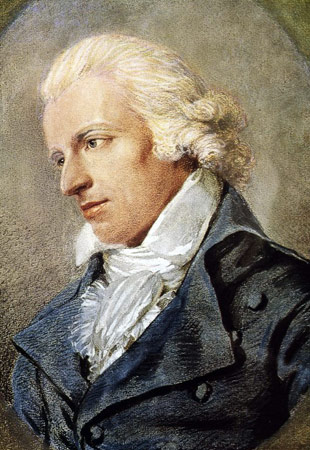
Friedrich Schiller
A Catholic monk and scholar, Snorri’s Christianity did not militate him to seek the eradication of Iceland’s rich commonwealth of heathen stories, but, on the contrary, it moved him charitably to preserve those sagas as a proper heritage of a newly baptized people. Snorri solved the problem of conflicting theologies intrinsic to his rather Ovidian undertaking by the trick of Euhemerism. The Aesir of the old pantheon were not, in fact, gods, although legend later represented them as such. So how had it really gone? Once upon a time, writes Snorri, in a great mead-hall called Troy, one of the twelve sub-kings, Munon, married a daughter, Troan, of the high king Priam. “They had a son… called Tror; [whom] we call… Thor.”16 After a time in Thrace, which “we call Thrudheim,” Thor “traveled in many countries” until, in the far north of “Enea” or Europe, he met “a prophetess named Sybil whom we call Sif, and married her.”17 Returning to Troy, Thor and Sif had many children and grandchildren, including Odin, who, finding his prospects limited by so many elder brothers, set out for Uppsala in Sweden, where he established a city “on the same pattern as had been in Troy.”18
Schiller would necessarily agree that if the Aeneid were sentimental then the History and the Edda would be doubly sentimental. To the degree that in Virgil sentimentality includes an element of resentment, however, Geoffrey and Snorri would significantly differentiate themselves from their Latin precursor. While Geoffrey and Snorri imitate Virgil, to the extent of borrowing his poetic conjuration quite blatantly, it would seem that they agree with Ovid. Possibly in the bewildering Völkerwanderungen at the catastrophic end of the Bronze Age, exiles from Anatolia actually gained Italy and made an impression on the indigenes, but Virgil inflates the folk-memory to avoid expressing a truth so true that it is a truism: Greece taught Rome civilization. Ovid, Geoffrey, and Snorri see it otherwise than Virgil: A people on coming into self-consciousness, requires a story of its foundation, to be sure; but there is no shame in acknowledging that that foundation contains a foreign part or participates in an external principle. A good thing it is and not at all demeaning that Cambria can link itself to Troy and Rome or that the Icelanders can share the hearth-gods, so to speak, of the Phrygians and the Italiotes.
While it remains true in a strictly archaic context that hearth and family are inseparable, such that no one may worship at two hearths, nor may foci be fused, the city hence also civilization can only arise by creating a new level, in Greek a synoikism, in which the separate households merge to form a larger community more complex in pattern than the household itself. In a provocative study, Eccentric Culture: A Theory of Western Civilization (1992), the French historian Rémi Brague (born 1947) argues no less a thesis than that the Occident uniquely is a political-cultural order and historical continuity that have their founding principle outside of themselves. Rome, not Greece, is for Brague the beginning of the West, properly speaking. Rome knew itself, Brague argues, as the trustee of “a cultural borrowing,” but Rome also reconciled itself to the trustee role and thereby disarmed its “feeling of cultural inferiority toward the Greeks.”19 Being the imperial victor, Rome could accept its status of cultural secondarity. As Rome exercised her Imperium, she would, as Brague writes, paraphrasing a passage from Virgil, be “putting some order into a scene in which [she herself was] not… the protagonist.”20
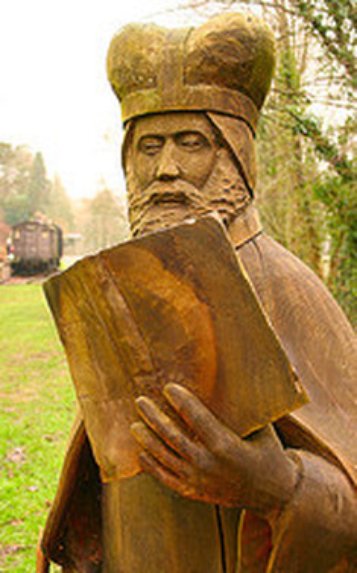
Geoffrey of Monmouth
Brague invokes an infrastructural metaphor to sum up the paradoxical character of Romanitas – nothing less than the aqueduct. Brague writes that “Roman culture is… essentially a passage”; it is “a way, or maybe an aqueduct.”21 Brague’s explanation involves a number of incisive observations. For example, “The Romans at least had the courage to bow down to Greek culture and to admit that they were a rough-hewn people, but nevertheless a people capable of learning.”22 Indeed, a noticeable eagerness to learn imbues the reception of Hellenism as it makes its way north through the Italian peninsula from the Fifth Century BC onwards. Ovid’s fantastic scene of Pythagoras instructing Brague’s “rough people” is not so farfetched. “Anyone is ‘Roman,’” Brague argues, “who knows and feels himself caught between something like a ‘Hellenism’ and something like ‘barbarity.’”23 Brague adds, however, that such intermediacy is not “neutral”; the consciousness that it implies consists, he writes, “in knowing that one is oneself the scene in which everything takes place, in knowing oneself stretched between a classicism to assimilate and an inner barbarity.”24 Brague’s description might explain Virgil’s ambiguity about his epic; it might also be applied with justice to Ovid, who appears in light of it as more Roman than his elder.
Brague’s phenomenology of the curatorial consciousness as provoked by the Roman predicament shows no little resemblance to Coulanges’ description of the pious consciousness as provoked by the primeval hearth-cult, in which the living generation sees itself precisely as intermediate and in the service of what precedes it on the one hand and what follows it, on the other – the ancestors, namely, and the descendants. The Romans, however, literally took to their worship gods foreign to them, an adoption that entailed to some degree at first and then increasingly, detachment from all the levels of the natively Italian religiosity. Not even the Christianization of the Empire, mild at first under Constantine but becoming draconian under Theodosius and Justinian, could eradicate Rome’s Cult of Hellenism. Justinian’s petulant closure of the Platonic Academy in 529 had its riposte in Cassiodorus’ foundation of his Vivarium just a bit later, to institutionalize the active preservation of Classical – that is, Pagan – literary and philosophical culture. Cassiodorus is significant in another way. Not only was he a Christian who devoted himself to Hellenism; he was a Roman aristocrat from an ancient family who collaborated with a Gothic king, Theodoric, whom some parties regarded as a foreign usurper.
The Gothic successors of the Western Empire stood to Romanitas as Romanitas stood to Hellenism, in a relation of secondarity or even second or third secondarity. When Jordanes, in his Origin and Deeds of the Goths (mid-Sixth Century), narrates Theodoric’s departure from Constantinople for Italy, where with the Eastern Emperor’s permission he would establish himself as viceroy, he uses this quaint phrase: “He set out for Hesperia.”25 Jordanes’ allusion to Virgil anticipates the Trojan pedigrees that Geoffrey furnishes for the Britannic kings of the annals and Snorri for the Aesir of the sagas. That the gesture is self-conscious to the point of sentimentality neither belies nor obviates it. Now a sentiment, like a father, might be a burden onerous to shoulder, but that fact never divests it of sincerity, either. A complementary image of shouldering the father, as Brague reminds his readers, is standing on the shoulders of giants, the structure of which subordinates the subject in a slightly different way from the onus, but insists on that subordination nevertheless. In Medieval stained glass, the Saints stand on the shoulders of the Prophets; in Gothic decorative statuary, Pagan figures mingle with Hebrew and Christian figures. It is nearly a thesis in capital letters.
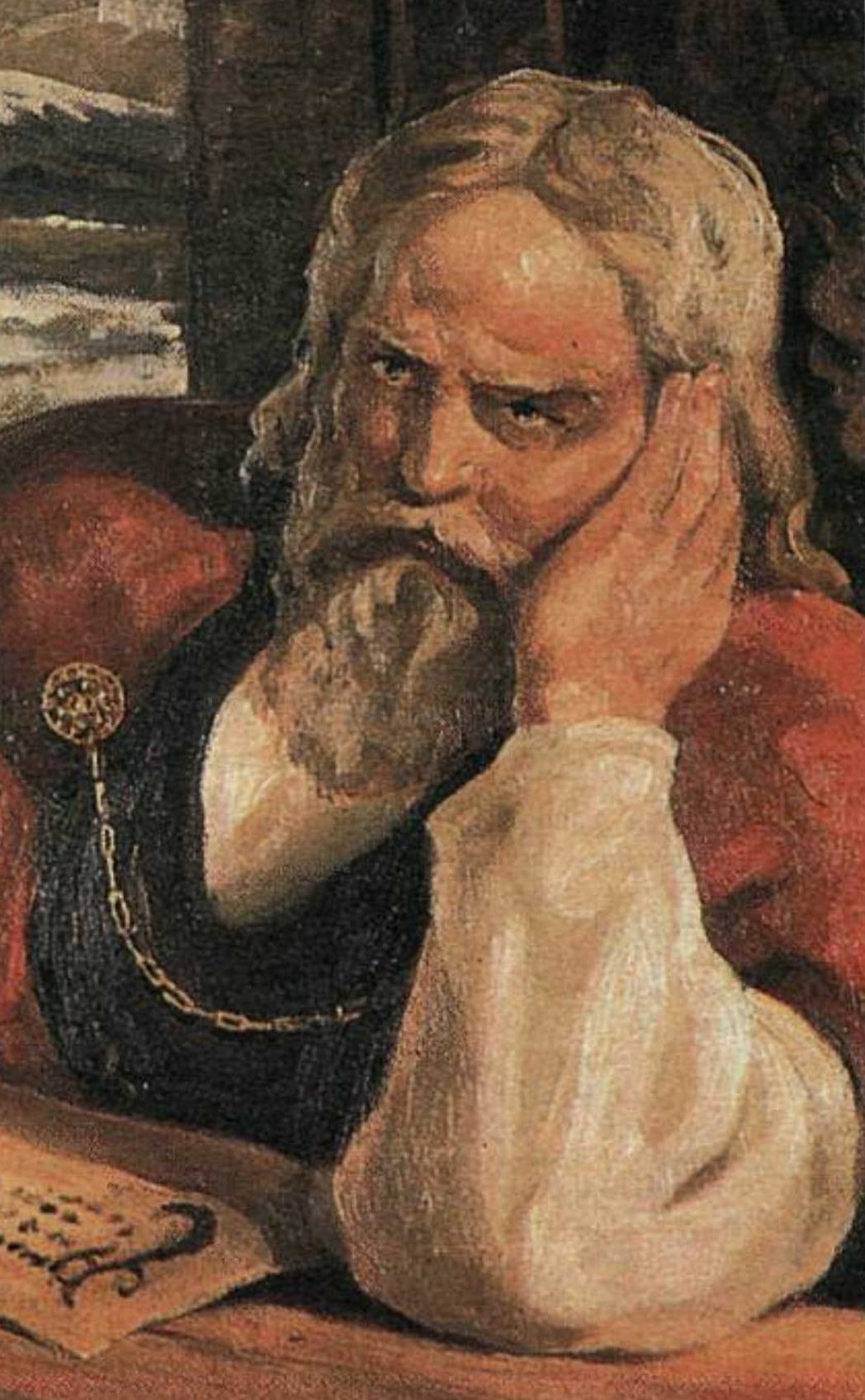
Snorri Sturluson
The two images stand in common tension with an opposite image that takes the form of the consciousness or identity that claims, for its own part, an entirely autogenetic status. For Brague, the prototype of that stance is the Second Century Marcionite heresy. As did many Gnostics, Marcion of Sinope (85 – 160) hated and rejected the Old Testament, arguing in respect of the New Testament what Islam would later argue in respect of the Koran, that it was aboriginally new hence genuinely and uniquely primordial and that it therefore abrogated everything that claimed spuriously to have come before it. Modern liberal people are the issue of Marcion despite their complete unfamiliarity with him, and their deluded consciousness corresponds to his point by point. Modernity and liberalism, in the making since the Eighteenth Century at the latest, and currently triumphant in the West, exist in a second reality in which all debts have been cancelled, all obligations annulled, and the way lies open to that urge without origin or goal that goes by the name of progress. Tellingly, in its acute current phase, the modern liberal regime has mounted an explicit attack on family, attempting to define the institution away by imposing contradictory deformations on it by judicial fiat. Likewise, the modern liberal regime attacks sovereignty, the concept that separates one nation from another and by doing so guarantees a people’s rights. The modern liberal regime seeks, rather, a globalizing borderless society in which differential evaluation of ethoi and defense of one’s proper ethos are criminalized. The modern liberal regime pursues an agenda of forced promiscuity for the sake of abolishing difference, while insisting contradictorily that difference is a supreme value. The modern liberal regime collectivizes, homogenizes, and atomizes all at the same time.
In recent decades under the modern liberal regime, identity has increasingly become a theme. It is an awkward theme for the modern liberal regime because that regime wants to valorize identity selectively and because identity, unless there is only one identity, threatens its goal of universal Gleichschaltung. Under the modern liberal regime, then, some people may assert a specific identity validly but others absolutely may not – in Great Britain, Sweden, and Germany under penalty of law. Nomadic strangers, who have committed the betrayal of abandoning their native hearths to participate in Western self-dissolution, not only may advertise their supposed identity and profit by it through official celebration, social preference, and the transfer of wealth; they may enjoy the privilege not to agnate themselves to the genius loci of their destination. When the nomads are idolaters of a pedophiliac warlord, they come with the explicit aim violently to eradicate any autochthonous continuity of tradition and to replace it with their own Marcionite types of collectivization, homogenization, and atomization. Of course, these processes have already been undertaken – practically speaking on behalf of Islam – by three hundred years of the self-denominating Enlightenment.

Rémi Brague
Let not the ravaging effect of those three hundred years be underestimated. Western Civilization has all but completed its project of total self-effacement by the repudiation of its past and the annulment of its future, in the previous century by two phases of a single suicidal war, and in the present one by the dissolution of borders, voluntary sterility, and the criminal project of a deracinating, non-educational anti-curriculum in the schools, in all nations, and at all levels. That there are no giants on whose shoulders one might stand and that fathers are wicked tyrants who deserve disownment are the only two lessons that American college freshmen carry with them out of their twelve-year indoctrination in schools that can no longer accurately be described as public, but only as elite-compliant and pedagogically perverse. Those lessons are now also the only lessons taught in university humanities departments. The establishment’s determination to drive Christianity out of the forum and out of existence altogether runs in parallel to the amnesia-induction of schooling. The conclusions of the redoubtable M. Coulanges in his concluding chapter notwithstanding, Christianity did not, in fact, repudiate its secondarity vis-à-vis Hellenism, but rather affirmed it and took up the curation of it. The war on Christianity thus qualifies itself as a particularly vicious program of the new Marcionite dispensation.
A disorganized response to this unprecedented crisis of cultural self-obliteration has lately appeared in the identitarian movements of the New Right, but it might well be a case of too little, too late. It is moderately heartening to read in Alain de Benoist and Charles Champetier’s Manifesto for a European Renaissance (2012) the recognition that “human life is necessarily rooted in a given context, prior to the way [individuals] formulate their aspirations and goals”; that “as for differences between cultures, they are effects neither of illusion nor of transitory, contingent or secondary characteristics”; and that the name of Johann Gottfried Herder is still a reference for a vanishing minority.26 Nevertheless, even the stellar lights of the New Right are jet-setters and cosmopolites in practice, the possibility of any type of sedentary intellectual life having been canceled by the necessity of earning one’s keep in the modern liberal economy of mandatory geographical displacement and constant travel. Coulanges could already write in 1864: “For us the house is merely a domicile – a shelter; we leave it, and forget it with little trouble; or if we are attached to it, this is merely by the force of habit and of recollections.”27 Movement, constant movement, rather than trans-generational emplacement, is the keynote of these times. So is the resentful rejection of any patrimonial indebtedness.
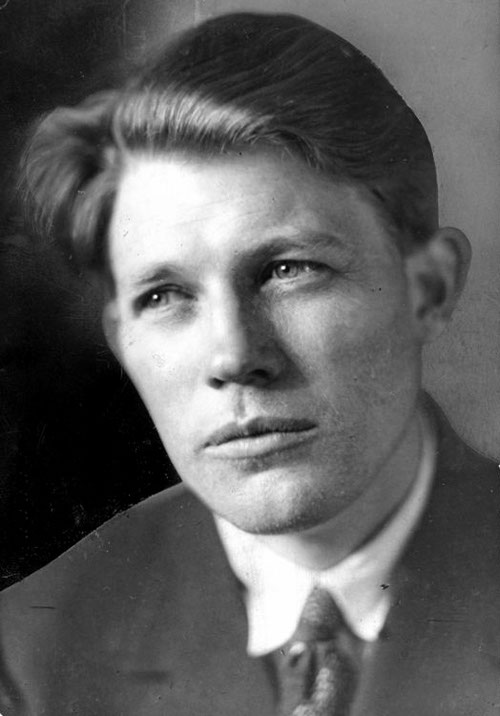
Harry Martinson
The modern epicists (yes – there are modern epicists) have sensed this, which is why, turning to them, we should take them seriously. The crisis of the Swede Harry Martinson’s Aniara: A Review of Mankind in Time and Space (1956) differs not so much from that of the Roman Virgil’s Aeneid, which Martinson, a spiritual descendant of Snorri, knew as well as Virgil knew the Iliad and the Odyssey. Like the Aeneid, Aniara tells a story of fugue: From a poisoned Earth, the casualty of nuclear conflict, humanity finds itself in flight, seeking a new home on Mars. The great Goldondas or space-going refugee-carriers leave from Dorisborg, the last remaining intact city on Earth where everyone is already an uprooted wanderer detached from any native soil. Doris is Martinson’s poetic name for the Earth, derived it would seem from the Indo-European root dō, “to give,” as in to donate and donation, but with the implication also of reception, and with the further implication of indebtedness for what has been received. Dō communicates poetically with Da, the Doric word for Ge (Gaia) or Earth, another vocabulary item with an ancient Indo-European pedigree.
Martinson’s first-person narrator tells how when in Aniara any migrant departs this Earth, the law forbids him to take any “irradiated soil,” no matter how strong his sentiment, but expedites the shipment on his behalf of three cubic feet of uncontaminated glebe, to be handed over at the destination.28 The narrator remembers from his school years a related convention: Although fallout has blighted the forests and wood is scarce, each graduating class participates in the spectacle of seeing “natural fire… kindled… in a stick of wood / which, shown about, sputtered its reek / and gave even some warmth.”29 Already in coining the name Doris, Martinson has re-conjured the archaic lifeworld in its essential details. Stipulating the two customs reinforces thus the connotation: Fire belongs to Earth, as the hearth; without a hearth there is no home, and without a home there is no identity beyond an abstract and jejune personhood. The import of Martinson’s epos is that, stretched too far, custom can only break. When Aniara goes off course and careens towards the constellation of Lyra in an irreversible hyperbola, the plight of the passengers, never to set foot again on any ground, but to endure terminal isolation in an artificial and sterile environment, becomes a metaphor for the prevailing socio-cultural malaise.

Ezra Pound, 1918. (Image by © E.O. Hoppé/CORBIS)
In Martinson’s poem, the goldonda called Aniara is passing endlessly and meaninglessly through the space-time continuum, but nothing is passing through the interior scene – to borrow Brague’s term – of any individual among the passengers and crew. The interior scene stands empty and the mediating role of the person, the very thing that grants him his paradoxical identity, has been annulled, first in the self-destruction visited by humanity on itself and second in the cosmic event that sends the space-ark off course, an event that would not have occurred had humanity not brought itself to such a dire straight. The Mima, Martinson’s anticipation of the Internet, can show the despondent voyagers random images from all over the galaxy, of this planet and that, of this society and that, but the multicultural panoply can reflect back to no viewer the proper image of himself, nor is there any prospect of grounding once again the hearth-fire, and of founding a new household, as there is in the Aeneid. The great continuity of tradition has been sundered – and none but a partial, much reduced humanity can remain: A residual humanity that cannot and swiftly does not recognize itself.
“Palace in smoky light,” writes Ezra Pound in his Canto IV; “Troy but a heap of smouldering boundary stones,” whereupon he coins a word, “ANAXIFORMINGES,” translatable as something like a pervasive ontological anxiety.30 Aniara, too, is a coinage, with Martinson like Pound indebting himself to Greek, and having the meaning of something like a prolonged cry of forlornness. Who will remember Pound? Who will remember Martinson? Who will remember Snorri, Geoffrey, Jordanes, Ovid, Virgil, Homer – or Troy? A favorite phrase of modern liberal people, used by them – as by their Puritan precursors, no doubt – never but to scorn and shame, is: “That is not who we are.” But who are they, who, uttering the apotropaic formula, claim for themselves proprietorship over the all-inclusive we? Perceptive people, the true Others of the modern liberal person, have begun to remark that the piety of inclusion is sacrificially exclusive, that it is inimical to any memory not of its own recent and counterfeit making; and that it dreams of annihilating everything not itself. A genuine new Western identity will perhaps be born in the belated but clear recognition of an absolute enmity that has not quite, but only just not quite, completed its agenda of malicious extirpation.
 – Thomas F. Bertonneau is an American intellectual and professor. He has taught at a variety of institutions, and has been a member of the English Faculty at State University of New York, Oswego, since 2001. His articles and essays have appeared in a diverse array of scholarly journals including William Carlos Williams Review, Wallace Stevens Journal, Studies in American Jewish Literature, North Dakota Quarterly, Michigan Academician, Paroles Gelées: UCLA French Studies, and Profils Americains. He was a major contributor to the English section of The Brussels Journal. More recently, his work has appeared in The University Bookman, the John William Pope Center for Higher Education Policy as well as the websites The People of Shambhala and The Orthosphere. His contribution to last year’s Symposium (“transcendence: community, nation, civilisation; religious aspects of the present turmoil”) was titled “Shostakovich’s ‘Leningrad Symphony’: Art Transcending Politics”.
– Thomas F. Bertonneau is an American intellectual and professor. He has taught at a variety of institutions, and has been a member of the English Faculty at State University of New York, Oswego, since 2001. His articles and essays have appeared in a diverse array of scholarly journals including William Carlos Williams Review, Wallace Stevens Journal, Studies in American Jewish Literature, North Dakota Quarterly, Michigan Academician, Paroles Gelées: UCLA French Studies, and Profils Americains. He was a major contributor to the English section of The Brussels Journal. More recently, his work has appeared in The University Bookman, the John William Pope Center for Higher Education Policy as well as the websites The People of Shambhala and The Orthosphere. His contribution to last year’s Symposium (“transcendence: community, nation, civilisation; religious aspects of the present turmoil”) was titled “Shostakovich’s ‘Leningrad Symphony’: Art Transcending Politics”.
Endnotes:
- Virgil, The Aeneid David West (trans.) (Penguin, 1991) p. 52.
- Fustel de Coulanges, The Ancient City: A Study of the Religion, Laws, and Institutions of Greece and Rome Small (trans., 1874) (Dover reprint, 2006 [1864]) p. 143.
- Ibid. p. 144.
- Ibid. p. 145.
- Virgil, op. cit. p. 15.
- Ibid. p. 16.
- Ibid.
- Fustel de Coulanges, op. cit. p. 61.
- Ibid.
- Ibid. p. 141.
- Ovid, The Metamorphoses David Raeburn (trans.) (Penguin, 2004) p. 614.
- Ibid. p. 614.
- Ibid. p. 615.
- Geoffrey of Monmouth, The History of the Kings of England Lewis Thorpe (trans.) (Penguin, 1966) p. 71.
- Ibid. p. 72.
- Snorri Sturluson, Edda Anthony Faulkes (trans.) (Everyman, 1987) p. 3.
- Ibid. p. 3.
- Ibid. p. 4.
- Rémi Brague, Eccentric Culture – A Theory of Western Civilization Samuel Lester (trans.) (St. Augustine’s Press, 2002) p. 35.
- Ibid. p. 38.
- Ibid. p. 40.
- Ibid. p. 39.
- Ibid.
- Ibid.
- Jordanes, The Origins and Deeds of the Goths Charles C. Mierow (trans.) (Pukka Classic, 2016) <www.arepo.biz> p. 161.
- Alain de Benoist and Charles Champetier, Manifesto for a European Renaissance (Arktos, 2012) p. 19.
- Fustel de Coulanges, op. cit. p. 99.
- Harry Martinson, Aniara: En Revy Om Mäniskan i Tid och Rum (Bonniers boktryckeri, 1963) pp. 13-14. Translated by the writer.
- Ibid. p. 30.
- Ezra Pound, The Cantos of Ezra Pound (New Directions, 1971) p. 13.
Citation Style:
This article is to be cited according to the following convention:
Thomas F. Bertonneau, “Identity: the Future of a Paradox” SydneyTrads – Weblog of the Sydney Traditionalist Forum (11 February 2017) <sydneytrads.com/2017/02/11/2017-symposium-thomas-f-bertonneau/> (accessed [date]).
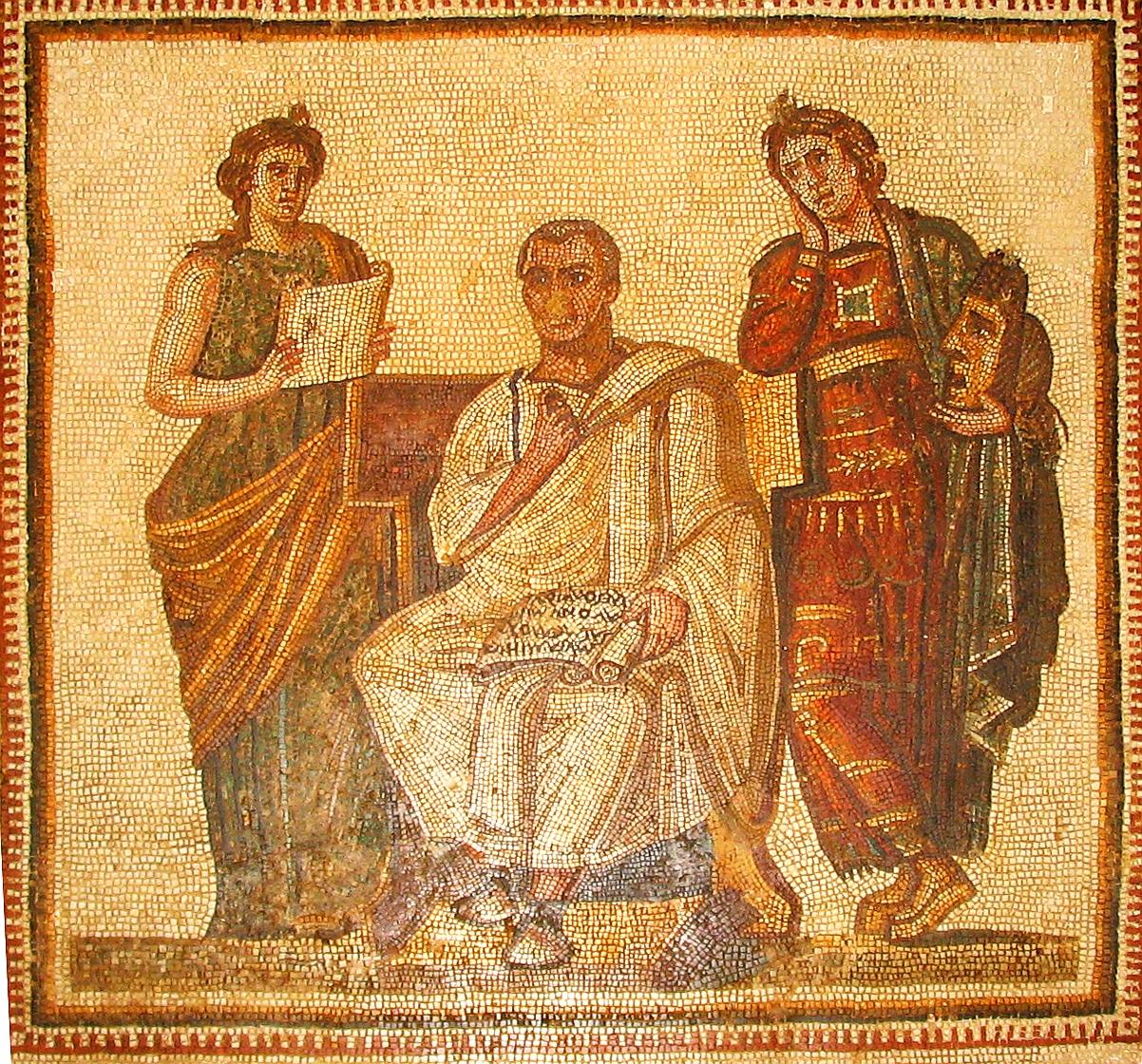



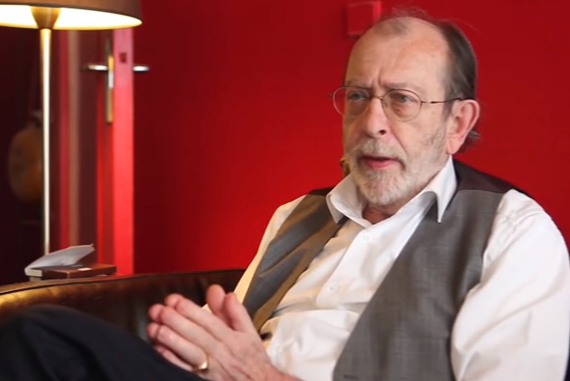
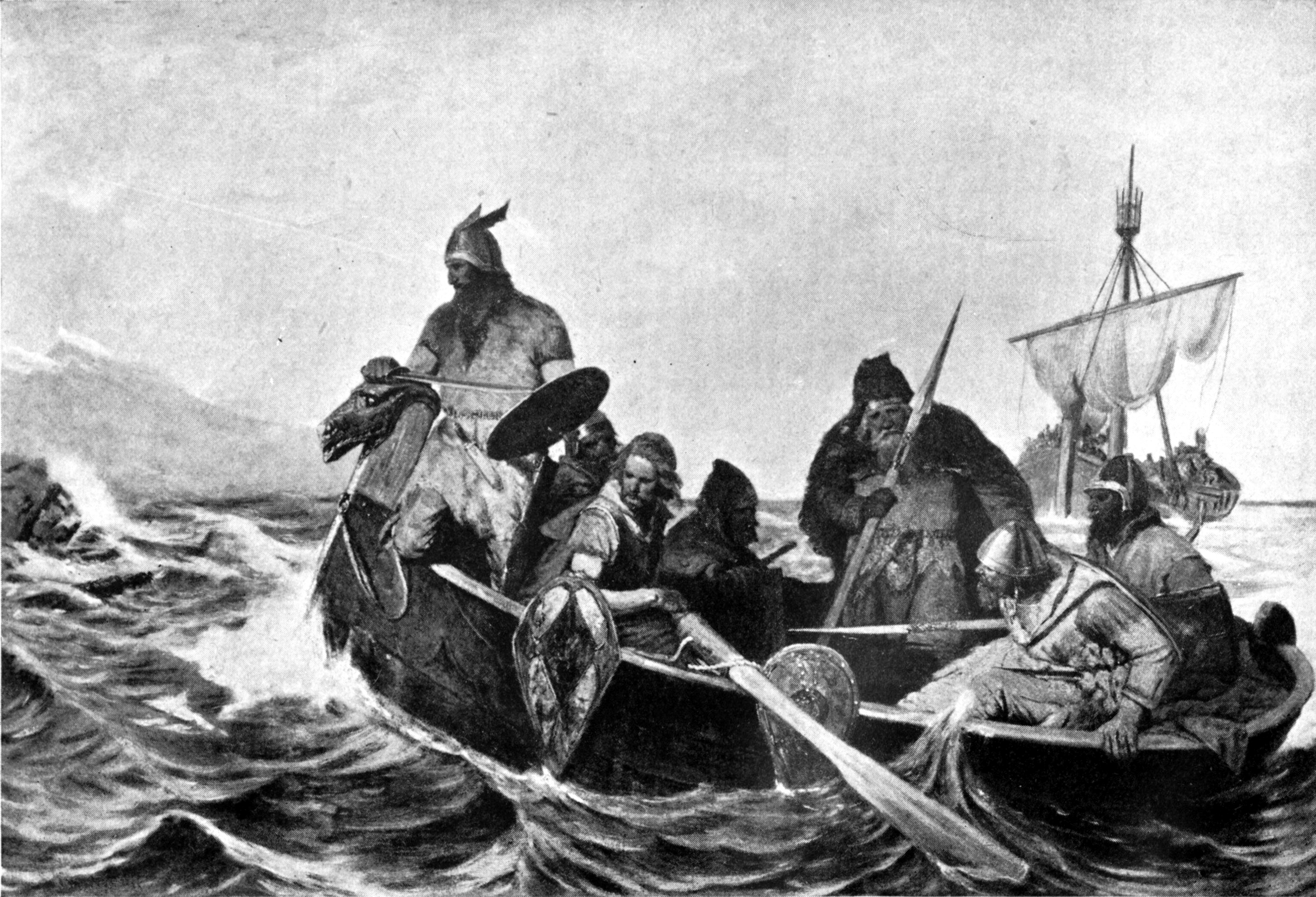
Leave a comment